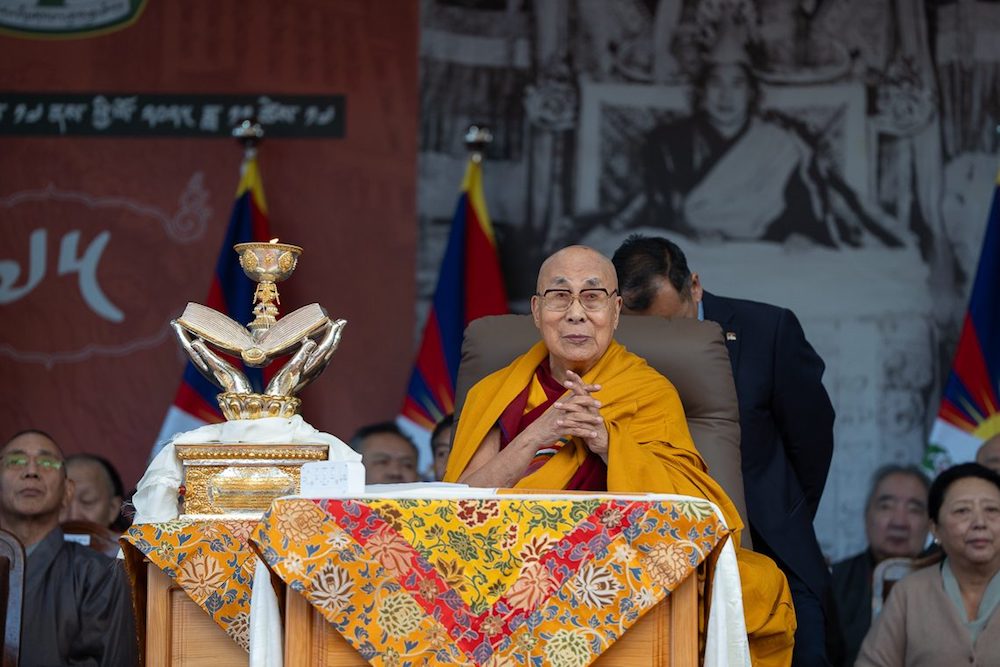By Bhuchung K. Tsering
Tibetan Review, March 2005
It was my plan to write about Nepal in this month’s column. However, when I was making preparation for the same, I did not envisage that there would be developments in Nepal that would impact the direction of my column.
My initial plan was to write about a positive development concerning Nepal and His Holiness the Dalai Lama. I had heard about the release of a CD by a Sherpa, Tsewang Sherpalama, called A Simple Monk. Subsequently, I ordered a copy and have been listening to it. It is a compilation of songs in praise of His Holiness and expands on his thoughts on world peace and compassion. What is unique about this CD is that it is all in the Nepali language.
According to Migyul, the Himalayan Community Magazine of New York that has produced the CD, “Buddhism in Nepal has come a full circle with this music CD. The Dalai Lama, the most revered international Buddhist leader, has been venerated and honored by Tsewang Sherpalama in the language of the land where the Buddha was born.”
It said, “Some of the biggest names in Nepali music industry such as Nhyoo Bajracharya, Manila and Uday Sohtang, Ani Choying and Dhakal have lent their voices to The Simple Monk. Four of the seven tracks are translations of the Dalai Lama’s teachings in Nepali, while two are in praise of the Dalai Lama. The seventh song, “ Ah yo Hai Losar”, proclaims the coming of Losar — New Year for all the Himalayan people.”
“It is the aim of the CD to take the simple message of peace of the Dalai Lama to the Himalayan people in the region of Nepal in the language that they are most comfortable with — Nepali,” Migyul added.
This could certainly be the first such CD of its kind in the Nepali language. The music certainly has a Nepali touch. Although I could not comprehend the lyrics, the English translation is available on Migyul’s website www.migyul.com.
While I treasure this CD as part of my overall attempt to appreciate Tibet-related music, the political symbolism of this CD is clear, particularly in the light of the Nepalese Government’s order to close down the Office of H.H. the Dalai Lama.
This single CD conveys the message of the age-old historical, cultural and spiritual ties between the Tibetans and the communities living in Nepal, who include the Sherpas, Manangis, Bara Gaunles, Lopas, Dolpopas, Limipas, Kirantis, Newars, Tamangs, Thakalis, Gurungs, Magars, Jirels, Thamis, Lepchas, Walungs, and Yolmos.
So at the people level, there certainly is the feeling of closeness with the Tibetans. It is only political leaders, who for the sake of political expediency, take certain shortsighted actions. I say shortsighted even from the perspective of Nepali politics because His Holiness the Dalai Lama is not just the leader of the Tibetan people. More than that, he is the source of spiritual refuge to thousands and thousands of citizens of Nepal who practice Tibetan Buddhism. By their action on the Office of H.H. the Dalai Lama, the Nepalese government has virtually ignored the sentiments of these communities. Some of them have already begun to speak out, e.g. the petition by the very many organizations based in New York. Even if they do not say anything publicly, the hurt will certainly be felt by the communities. This will not be good for the Nepal government in the long run.
Related to this is the sentiment of the Tibetan people. If indeed it was Chinese pressure that made the Nepalese Government take the step it is self-defeating to China in the long run. Those of us in exile form but a minority and our views may not really matter. What is important is the feeling of the Tibetans inside Tibet, particularly in Western Tibet along the long borders with Nepal. Even though Nepal may enjoy good ties with the Chinese Government, the day-to-day sentiments of the Tibetan people on the other side of the border cannot be dictated by politicians in Beijing. It is in China’s political interest to earn the trust of the Tibetan people. The Arniko Highway may physically link Nepal with Tibet, but closer people-to-people ties have to be cultivated over a long period of time and be nurtured in a cultural context. Therefore, the recent action by the Nepal Government has implications for Tibetans inside Tibet, with whom Nepal wants to interact in the field of trade and commerce. Despite all the challenges in the past several decades the love and reverence of the people of Tibet for His Holiness the Dalai Lama remain as strong as ever.
The happenings in Nepal are something that all Tibetans need to consider. In the greater scheme of things how do they impact our situation? In the past some people have ventured to forecast scenarios in the post-His Holiness situation. I don’t think it is in anyway inauspicious to be aware of the possibilities based on these incidents and to see what steps we can take to remedy the situation.
Such reality checks, as bad and unfortunate as they are, provoke us to think strategically and stop us from building political castles in the air.
Coming back to the CD, I recommend that the readers purchase a copy both for the music and for the political message it has. To order copies at $12 each, postpaid, you can send a check and your mailing address to: Migyul, 37-23 60th Street, Woodside, NY 11377. Migyul’s website did not have any information about availability of the CD in the Indian subcontinent, but that is something worthwhile to do for the majority of the audience is there.









